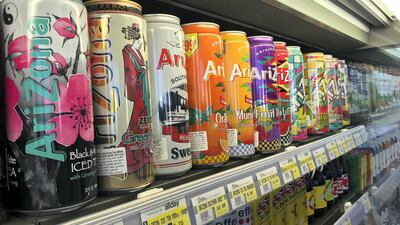Children hooked on the sugar rush of fizzy drinks face withdrawal symptoms similar to those battling drug or alcohol addiction, new research has found.
Headaches, cravings and irritability have been reported in youngsters who consumed more than three cans of fizzy drinks a day, and then abstained for three days in a study at the University of California (UC).
The findings, which have been published in the journal Appetite, come in the wake of a school in Dubai banning highly caffeinated and sugary drinks due to concerns over their negative impact on behaviour.
Staff at Deira International School (DIS) said some pupils admitted to relying on energy drinks to stay focused in class.
“The debate as to whether children actually experience sugar induced highs is ongoing, but it is undisputed high sugar intake leads to greater cravings,” said Sadaf Jalil Ahmed, a doctor at DIS.
“The body feels the need to maintain a higher level of sugar it has been trained to accept.
“Children and adults trying to unconsciously fulfil this deficit end up consuming more processed foods because the sugar rush is faster than natural produce.”
Results from the UC study add weight to the theory caffeine and sugar are addictive substances, and can push children towards unhealthy habits lasting a lifetime.
Children aged 13 to 18 who took part in the study showed significant changes in motivation, cravings and general well-being when switching from sugary drinks to milk or water.
The research, collected from beverage journals and regular interactions, showed early evidence of withdrawal symptoms and increased cravings in overweight or obese adolescents.
Researchers looked at the habits of 25 teenagers who were told to drink their normal beverages for five days, and then three days of just milk or water.
As well as contributing to a number of chronic diseases such as type 2 diabetes, the lead author of the research said young people could find it hard to quit a regular habit of sugar loaded fizzy drinks.
“Our findings — that these drinks may have addictive properties — make their ubiquitous availability and advertising to youth even more concerning for public health,” said Jennifer Falbe, assistant professor in the Department of Human Ecology at the University of California.
The report said adolescents were the biggest consumers of sugary drinks, were more susceptible to addictions and have had the greatest relative gains in obesity in recent decades.
“It is not easy to break these patterns,” said Dr Sadaf.
“Sugar addiction or dependence in children is making them more irritable and hyperactive.”
In 2017, the UAE Government hiked up prices of fizzy drinks by 50 per cent to encourage people to turn away from unhealthy products.
_________________
Read more:
Diabetes facility in Dubai expands to keep up with growing demand
UAE doctors tell of caffeine's 'toxic' effect on children's health
UAE needs food labels to warn consumers against unhealthy choices, say experts
_________________
“Those who consume higher amounts of sugar every day will have certain withdrawal symptoms in the form of cravings and loss of ability to concentrate and maybe headaches,” said Dr Ramsey Mustafa Al Omari, paediatric and neonatal consultant at the Canadian Specialist Hospital, Dubai.
“If children and adolescents are ingesting high amounts of sugar and caffeine, a nervous system stimulant, it may cause mild dependence.
“The UAE is very proactive and progressive in terms of setting the rules that benefit children.
“Drinks such as soft drinks, energy drinks, even fruit juices and certain milk drinks have been banned in the school canteens, effectively cutting down the supply to the children.”
Recommendations from the World Health Organisation suggest people should consume no more than 50g of added sugar daily, although that is expected to be slashed in half under new guidelines.
May Al Joudeh, a dietitian at Medeor 24x7 International Hospital, Al Ain said children with high sugar intake should gradually reduce their consumption habits.
“Adolescents need to take their time and reduce their consumption of sugary drinks little by little until they are eliminated completely from their diet,” she said.
“This will limit the effects of any withdrawal symptoms.
“Adolescents not only need to be taught on healthy eating, they need to be provided with healthier substitutes.”


